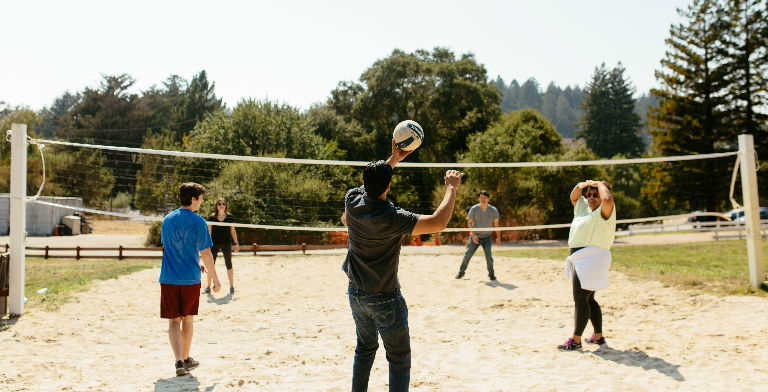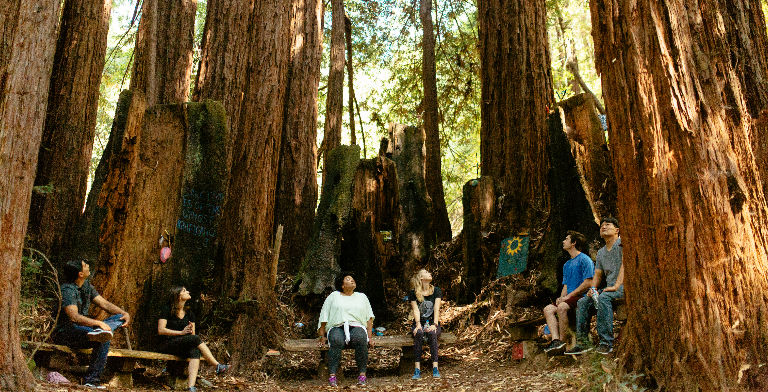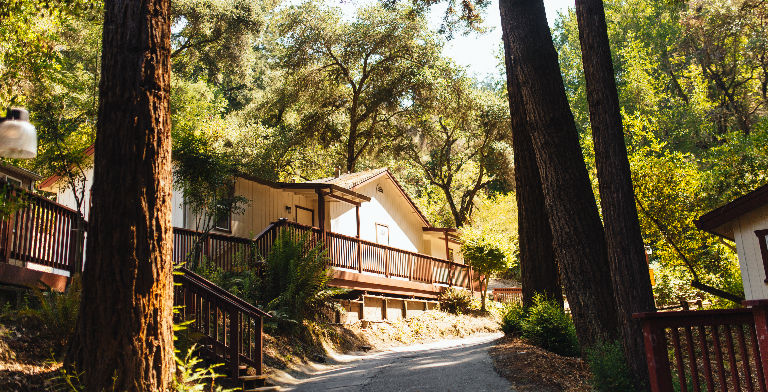The Camp Recovery Center helps adults struggling with opioid addiction find long-term recovery. Located near Scotts Valley & San Jose, CA, The Camp provides premier opioid addiction rehabilitation.
Opioid Addiction Rehab
Opioid Addiction Rehab Near Santa Cruz & San Jose
Opioid abuse is an unfortunately prevalent problem that has inflicted incalculable damage on individuals, families, and communities across the United States and throughout the world. The abuse of and dependence upon opioids, such as heroin and painkillers, have plagued the nation for more than a century, while the misuse of and addiction to prescription medications such as OxyContin and Vicodin are more recent threats to the health and wellbeing of adults. Abused both for recreational purposes and in misguided attempts to self-medicate, opioids are dangerous and highly addictive substances that put users at risk for significant physical, mental, emotional, and social damage.
At The Camp Recovery Center, we have established a safe and nurturing environment where individuals whose lives have been ravaged by opioid addiction can receive life-changing rehab from experienced professionals whose abilities are exceeded only by their commitment and compassion. The Camp remains a transformational recovery center where the pain of opioid addiction is replaced by the promise of lifelong recovery.
Helping a Loved One
Helping a Loved One or Family Member Enter Opioid Addiction Rehab
Having a close friend or family member who is struggling with an opioid addiction can be an exercise in pain, fear, and frustration. But the situation is not hopeless, and you should never feel as though you are helpless to effect positive change. There are a number of actions that you can take that can make a world of difference in your loved one’s life:
- Educate yourself about addiction in general and about the specific impact that opioid addiction can have on a person’s mind and body. This will give you important insights into the challenges that your loved one is facing.
- Learn about the options that are available for treating individuals who are struggling with opioid addiction.
- Research specific rehab centers and treatment programs that provide the type and level of care that your loved one needs.
- Talk to your loved one about his or her problems and your concerns. Do not judge or issue ultimatums; instead, approach this conversation with an open mind and an open heart, and be prepared to engage in a conversation, not deliver a lecture.
- When your loved one is ready to get help, volunteer to help make appointments, arrange visits at different rehab centers, provide transportation, and handle other logistics.
- Stay involved during and after your loved one is in rehab. Send messages of support, participate in family therapy, and plan to play an active role in your loved one’s post-rehab support network.
Most importantly, remember that deciding to receive treatment and enter rehab can be a hard decision, and that pursuing recovery is a long process. Do not expect quick solutions; instead, be prepared to be a long-term positive presence in your loved one’s life.
Why Consider Us?
Why Those Near Santa Cruz & San Jose Should Consider Opioid Addiction Treatment at The Camp Recovery Center
Untreated opioid addiction can lead to a myriad of physical, mental, emotional, and social problems. Chronic opioid abuse can result in dangerously low blood pressure, irregular heart rate, breathing problems, and hypoxia. Mentally and emotionally, opioid abuse and addiction can cause memory problems, cognitive impairment, anxiety, paranoia, hallucinations, and delusions. Dealing with these types of effects can make it virtually impossible for a person to perform as expected in school or at work, maintain healthy interpersonal relationships, or otherwise meet the responsibilities that are necessary to productively participate in everyday life. The resultant damage can include destroyed relationships, family discord, separation or divorce, job loss, chronic unemployment, financial ruin, and homelessness.
The good news is that the rehab services that are offered at The Camp Recovery Center have proved to be extremely effective at helping adolescents and adults who are struggling with opioid addiction. With the type and level of help that is available at The Camp, the despair of opioid addiction can be replaced by the hope of long-term opioid addiction recovery.
Types of Treatment
Types of Opioid Addiction Treatment Offered at The Camp Recovery Center
Nestled in the foothills of the majestic Santa Cruz Mountains, The Camp Recovery Center is a place of hope and healing where clinically sophisticated rehab is provided in a serene and secure environment.
For more than 30 years, The Camp has remained dedicated to providing the highest quality of life-changing rehab to adults who are struggling with opioid addiction and other forms of chemical dependency. Individuals who choose to enter treatment with us have the opportunity to work with talented and experienced nurses, addiction counselors, family therapists, and other professionals whose clinical expertise is surpassed only by their commitment and compassion.
Rehab at The Camp is a highly personalized experience, with each resident following a treatment plan that has been customized to ensure that we are providing the type and level of care that best meets his or her unique needs. The following are among the many elements that may be included in a resident’s treatment plan at The Camp:
Detoxification: For individuals who have been unable to rid their bodies of opioids or other drugs prior to arriving at The Camp, detoxification can be an essential precursor to full participation in treatment. When a resident is determined to be in need of detox services, we will coordinate with an offsite doctor, who will develop and approve an appropriate detox protocol. As is the case with all aspects of treatment at The Camp, detox protocols are developed and implemented in the manner that best meets the specific needs of each resident.
Medication management: Residents whose opioid abuse is accompanied by a co-occurring mental health condition may receive a referral to meet with a psychiatrist to determine if prescribed medication should be incorporated into their treatment plans. Residents who receive medications will meet with the psychiatrist on a weekly basis to monitor their progress and adjust their prescriptions if necessary. Members of our nursing staff also assist in monitoring residents’ medications.
Individual therapy: Residents and their case managers meet two times each week for individual therapy sessions. These sessions allow residents to process their experiences, discuss their progress, and address any concerns have arisen since the previous session.
Group therapy: Group therapy is an essential part of treatment for opioid addiction at The Camp. A variety of groups are scheduled every day, including weekends. Process groups are conducted five days a week. The following are examples of specific groups that may be conducted during a resident’s time at The Camp:
- Activity Group
- CBT Groups
- Detox Groups
- Experiential Group
- Focus Groups
- Music / Poetry Groups
- Men’s Group
- Women’s Group
The following are a few examples of the many topics that may be addressed in group therapy sessions at The Camp:
- Self-helping thinking
- 12-Step Recovery
- SMART Recovery
- Relapse prevention
Family therapy: Residents receiving treatment for opioid addiction have the opportunity to participate in family therapy sessions twice each month. These sessions, which are led by marriage and family therapists, are designed to facilitate healthy communication among family members, address negative feelings and emotions that arise due to opioid addiction, and promote the healing and strengthening of the family unit.
Experiential therapy: A variety of experiential therapies are scheduled every week at The Camp. Residents also have the opportunity to spend time in our gym six days a week. Additional experiential therapies at our treatment center include the following:
- Acupuncture
- Meditation
- Yoga
Community meetings: Resident-run community meetings are held every morning, including both weekdays and on the weekends. These meetings, which are a major component of the rehab process at The Camp, provide an opportunity for residents to review the agenda for the day, do readings, and address any issues that are relevant to the group. In addition to being sources of important information, community groups promote healthy independence and interdependence while also facilitating the formation of productive sober relationships that can be essential to supporting long-term recovery.
At The Camp Recovery Center, we know that residential rehab is just one step on the path of lifelong recovery from opioid addiction. To ensure that every adult who completes treatment with us is best prepared for the next phase of his or her recovery, our case managers work closely with all residents to ensure that sources of continuing care and support have been identified, and all necessary arrangements for accessing this care have been made prior to discharge.
For adult residents who need a more structured level of care during their transition from residential rehab, we also offer intensive outpatient programming (IOP). Intensive outpatient programming is located convenient to the Santa Cruz and San Jose, CA areas.
In the same manner that we provide a highly personalized treatment experience during a resident’s time at The Camp, we are similarly dedicated to ensuring that, as they prepare to leave our treatment center, all residents have a continuing care plan that addresses the specific issues that are essential to their long-term recovery from opioid addiction.
















